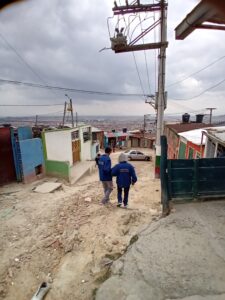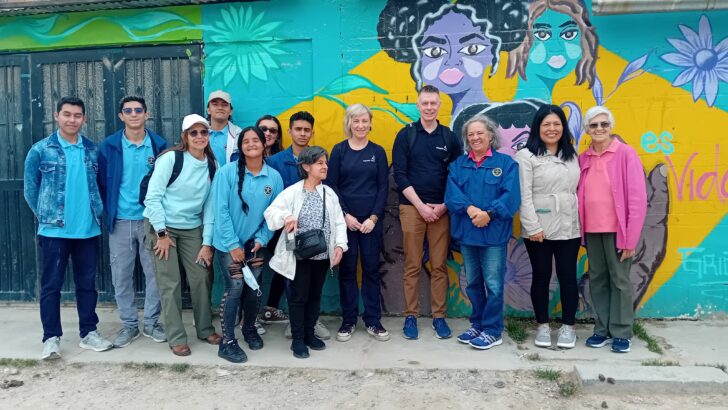Misean Cara is an Irish faith-based membership organisation, celebrating its 20th Anniversary this year, having been founded in 2004. Misean Cara supports the international development work of Irish missionaries working overseas, and is made up of 77 missionary and lay organisations working in more than 50 countries to empower those left furthest behind.
Witnessing the work of Missionaries in Colombia

In March this year Jennifer Donovan, Misean Cara’s Donor Engagement Manager, travelled to Bogota, Colombia to attend a conference organised by the Conference of Bishops of Latin America (CELAM), which followed a calling from Pope Francis for renewal and reform of the Catholic Church towards a Synodal Approach. She met with Catholic philanthropic organisations, the Pontifical Commission for Latin America, and the Vatican’s Dicastery of Human Integral Development who all came together to explore new approaches to cooperation between donors.
The work of Misean Cara’s Missionary members is very much in line with the synodal approach. Missionaries are involved in a current movement towards transferring the running of overseas project to local leadership (called ‘locally led development’). Misean Cara is supporting its members to encourage participation and dialogue with the local project teams and involving the community in the decision-making process about the future of projects aimed at lifting people out of poverty and hardship.
“Whilst in Colombia, I had the pleasure of visiting a Misean Cara supported project in a very disadvantaged area of Bogota, which very much encapsulates the synodal approach: the Codo a Codo project run by the Little Sisters of the Assumption,” Jennifer explains.
“As we drove further out of the bustling city of Bogota the levels of poverty in our surroundings steadily increased until we reached the informal settlement of Altos de la Florida. When we arrived we were warmly greeted by the staff and volunteers of the project who told us about some of the issues the community faced, such as how young people and children as young as 12 years old are recruited for armed groups and criminal activities,” she continued. “The neighbourhood is in an impoverished estate and the community faces challenges such as erosion of the surrounding soil, poor access to electricity, no aqueduct or sewerage, no running water, and unpaved roads that are liable to flooding.”
The Altos de la Florida neighbourhood faces a high degree of insecurity, displacement, persecution and drug trafficking. The number of inhabitants has increased in recent years due to internal displacement and migration of refugees from Venezuela. The entire population is poor or vulnerable, and the heads of households, mostly women, work in informal jobs, such as street vendors, loading and unloading cargo vehicles, service in family homes to name a few, which generates very low income and places them on the margins of social security. These conditions were aggravated further in 2020 by the COVID-19 pandemic and the quarantines and isolation decreed to contain its spread. A staggering ninety per cent of the population became unemployed.
Codo a Codo has been working tirelessly for over 16 years to improve the prospects for those in the community. The Sisters and the project team work with a community of 2,500 families, serving the most vulnerable: young children, youths, women and the elderly. For young children they provide access to the basics and other items often taken for granted in wealthier countries, such as toys, a safe space to play and learn, to grow and develop. An interactive library offers support for schoolwork, computers, workshop and a place to study for older children. Musical workshops, singing, playing instruments and a drama group encourage open and active minds, and shared fun. Sports training on weekends fuel physical activity and mental development, all these activities encourage young people to focus on brighter futures and alternatives to joining gangs.
Empowerment and training of young people as youth leaders play a crucial role in generating youth responsibility and solidarity within the community. While training and support is also provided for youth and women’s entrepreneurship, which gives participants opportunities for income generating activities and helps break the poverty cycle.
Across the board, project participants can access services such as psychological counselling and individual or family care with university practitioners, professional volunteers, as well as spiritual guidance and sometimes just a friendly ear for listening. This project was established by Sr. Norma Bernales, who sadly passed away shortly after the Misean Cara team’s recent visit, leaving a living a critical legacy in her wake.
Missionaries across the world, like Sr. Norma, have played a pivotal role in some of the most disadvantaged communities, reaching the furthest behind and going where the need is the greatest. Their work continues today and their living legacies can been seen across the world.
More about Misean Cara
Last year alone, Misean Cara supported 52 member congregations to deliver 321 projects in 52 countries. These projects helped transform the lives of nearly 1.9 million people across the global south by upholding the right to climate resilient livelihoods and decent jobs, quality education, better health, human rights and support during emergencies.
Missionaries are unique in their way of working. They have a long tradition of working in extremely challenging environments, including conflict zones, motivated by a deep commitment to combat poverty by upholding human dignity and human rights. Missionaries immerse themselves in the communities they serve, forging enduring relationships built on trust that become the foundation for effect and sustainable development initiatives. To help ensure the success of their projects, Misean Cara supports its members with funding, capacity development, mentorship, monitoring and evaluation, and opportunities to share learning.
Every year the demand for support from Misean Cara exceeds the funds available to members. If possible, please consider leaving a gift in your Will to Misean Cara. Your gift will enable the next generation of Irish missionary organisations to continue their work and reach those furthest behind.
For more information contact Jennifer Donovan jdonovan@misean.cara.ie or phone (01) 405 5028.
To learn more about leaving a legacy gift to Misean Cara you can also visit www.miseancara.ie/legacy


 Misean Cara Donor Engagement Manager, Jennifer Donovan (5th from right) with a team from the Codo a Codo project, and other Misean Cara staff, at a visit to the project in 2023.
Misean Cara Donor Engagement Manager, Jennifer Donovan (5th from right) with a team from the Codo a Codo project, and other Misean Cara staff, at a visit to the project in 2023. 